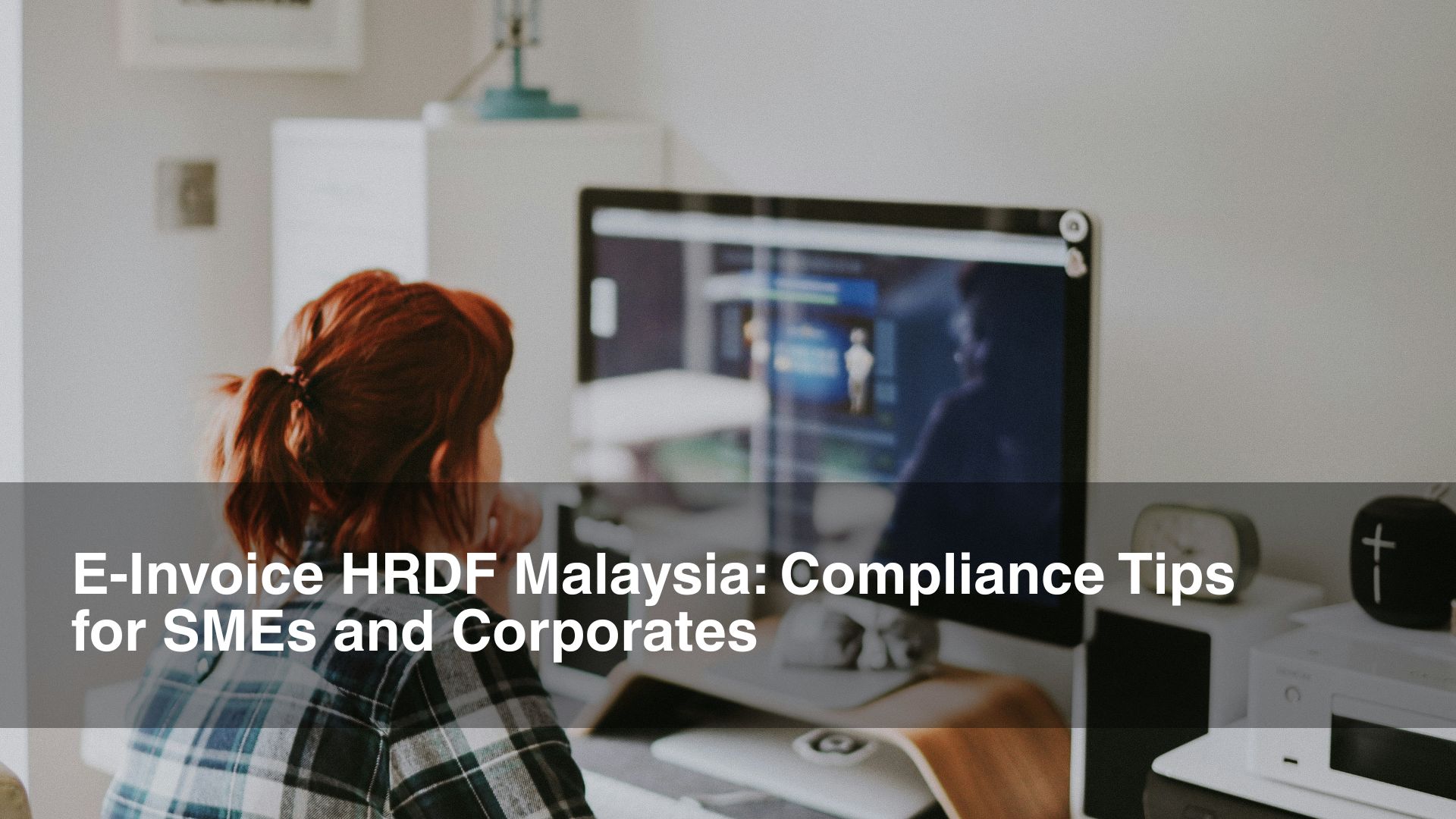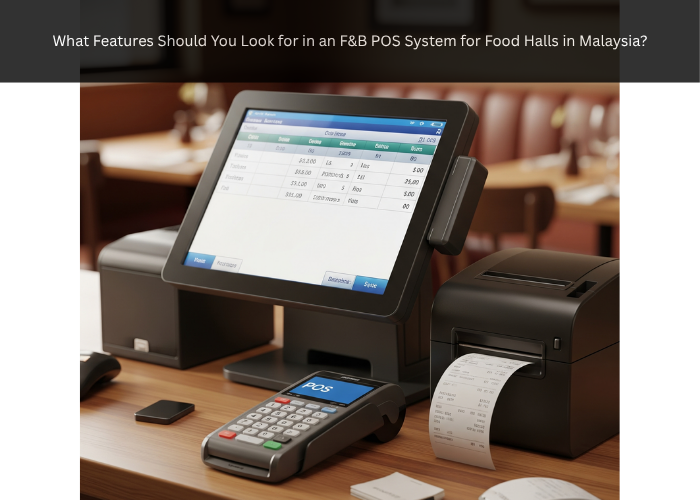Understanding E-Invoice HRDF Malaysia
The e-invoice HRDF Malaysia is an electronic invoice system developed to streamline invoicing processes in compliance with the regulations set forth by the Human Resources Development Fund (HRDF). This initiative plays a significant role in promoting transparency and efficiency within the financial operations of organizations, particularly small and medium enterprises (SMEs) and corporates. By automating the invoicing process, e-invoicing reduces the potential for errors that can arise from manual processing, thus enhancing accuracy in financial reporting.
The regulatory framework established by HRDF mandates organizations to adopt e-invoicing as part of their compliance obligations. The main aim of this initiative is to facilitate a more organized approach to financial transactions, ensuring that all invoicing adheres to standardized practices that are recognized nationally. This improved compliance not only safeguards businesses against potential penalties but also contributes to a more robust financial ecosystem in Malaysia.
Implementing e-invoice systems comes with various operational and financial benefits. For one, organizations that adopt e-invoicing experience quicker processing times, allowing for faster payment cycles which improve cash flow management. In addition, the digitization of invoices enables organizations to store and access documents more efficiently, reducing clutter and physical storage costs. Furthermore, e-invoices can lead to enhanced financial forecasting and efficient record-keeping, allowing businesses to make informed decisions based on real-time data analytics.
It’s essential for SMEs and corporates to recognize the importance of e-invoice HRDF Malaysia in the broader scope of their financial operations. As compliance with HRDF regulations becomes increasingly mandatory, engaging with e-invoicing systems allows organizations not only to adhere to legal requirements but also to enhance their overall operational efficiency, leading to sustainable business growth.
The Legal Framework for E-Invoicing in Malaysia
The introduction of e-invoicing in Malaysia marks a significant advancement in the nation’s efforts to modernize its tax system and improve compliance among businesses. As part of the digital transformation, businesses are required to adhere to stringent legal frameworks that govern e-invoicing practices, especially concerning HRDF (Human Resources Development Fund) compliance. The main legal instruments that shape the landscape of e-invoicing in Malaysia include the Income Tax Act 1967, the Goods and Services Tax Act 2014, and various guidelines published by the Malaysian government.
The Income Tax Act outlines the requirements for accurate record-keeping and documentation, thus emphasizing the importance of e-invoices in fulfilling tax obligations. It mandates that all businesses, regardless of size, maintain proper records and comply with tax submissions to ensure transparency and accountability. Further, the Goods and Services Tax Act specifies how tax invoices must be issued, detailing the necessary information that an e-invoice HRDF Malaysia must contain to be deemed valid.
To ensure compliance, organizations must stay informed about guidelines issued by the Ministry of Finance and the Royal Malaysian Customs Department, as these bodies frequently update their regulations to reflect changing economic conditions and technological advancements. Additionally, companies are advised to conduct regular training and audits to ensure all staff managing invoicing processes are knowledgeable about the legal requirements.
Private companies and SMEs are especially encouraged to adopt e-invoicing as it not only helps in compliance with HRDF regulations but also streamlines operations and reduces the possibility of errors. Compliance with the legal framework governing e-invoicing not only enhances fiscal responsibility but also fosters trust between businesses and government authorities.
Common Compliance Mistakes
The implementation of e-invoice HRDF Malaysia comes with numerous advantages, particularly in streamlining the invoicing process for SMEs and corporates. However, many organizations encounter compliance pitfalls that can lead to significant setbacks. Understanding and avoiding these common mistakes is crucial for maintaining adherence to HRDF guidelines.
One prevalent mistake is the failure to correctly validate the e-invoices before submission. This includes not ensuring that the information such as Tax Identification Number or employer registration number is accurate. For instance, if an e-invoice includes incorrect details, it can result in delayed payments or even disputes, ultimately affecting cash flow.
Another common error is neglecting to keep up with HRDF policy changes. The HRDF often updates its compliance requirements, and staying informed is essential. Corporations that do not align their e-invoice procedures with the latest regulations risk incurring penalties or being disqualified from claiming benefits associated with the e-invoice HRDF Malaysia system.
Additionally, many organizations fail to maintain proper documentation related to their e-invoicing activities. Companies should keep a comprehensive record of all transactions and correspondence, as this ensures transparency and makes it easier to address any discrepancies that may arise later. Without adequate documentation, organizations may find it challenging to defend themselves during audits or investigations.
Moreover, the use of non-standardized formats for e-invoicing can cause complications. While the HRDF stipulates specific formats for submission, ignoring these guidelines may lead to processing errors or rejections, further delaying payments. Organizations should be diligent in adhering to the prescribed formats to avoid these issues.
In conclusion, by recognizing and mitigating these compliance mistakes, SMEs and corporates can enhance their invoicing processes and ensure that they remain aligned with the e-invoice HRDF Malaysia requirements. Taking proactive steps will ultimately contribute to the efficiency and effectiveness of financial operations.
Key Compliance Tips
In order to ensure compliance with e-invoice HRDF Malaysia, it is essential for SMEs and corporates to adopt best practices that streamline their invoicing processes while meeting regulatory requirements. First and foremost, organizations must familiarize themselves with the relevant regulations governing e-invoicing, particularly those specific to the Human Resource Development Fund (HRDF). Understanding these regulations will provide a solid foundation for compliance and prevent potential penalties.
Secondly, employing a robust e-invoicing system is crucial. Businesses should select a software that not only supports HRDF requirements but also integrates seamlessly with existing accounting systems. This integration can enhance accuracy, reduce manual entry errors, and improve the efficiency of the invoicing process. Regular updates to the software are also necessary to ensure ongoing compliance with any changes in the legislation affecting e-invoices in Malaysia.
Furthermore, it is beneficial to adopt an organized approach to documentation. Keeping detailed records of all transactions, including e-invoices submitted to HRDF, is vital for transparency and accountability. Regular audits of these records can help ensure that the invoicing processes remain compliant with HRDF standards while also allowing businesses to rectify any discrepancies as they arise.
Training staff members on the importance of adhering to e-invoicing protocols is another key factor for compliance. By ensuring that employees are well-versed in the requirements and processes associated with e-invoice HRDF Malaysia, organizations can promote adherence to these practices across all departments involved in finance and accounting.
Finally, it is advisable to seek guidance from a compliance expert or legal advisor who specializes in HRDF regulations. This external advice can provide valuable insights that may not be apparent internally, thereby enhancing overall compliance efforts. By implementing these practical steps, SMEs and corporates can position themselves for success with e-invoicing under HRDF Malaysia.
Technology Solutions for E-Invoice HRDF Malaysia Compliance
In the evolving landscape of financial management, businesses must adopt technology solutions to ensure compliance with the e-invoice HRDF Malaysia requirements. Various software and platforms are available that cater to the needs of SMEs and corporates, streamlining the invoicing process while maintaining adherence to regulatory standards. These solutions not only enhance accountability but also facilitate smoother operations.
One prominent solution is automated invoicing software, which significantly reduces the administrative burden associated with manual processes. Such systems generally offer features such as electronic signature capabilities, archive management, and integration with existing accounting software. By automating invoice generation, businesses can minimize errors and expedite the approval process, ultimately ensuring timely submissions as per HRDF regulations.
Another beneficial technology is cloud-based invoicing platforms. These solutions allow users to access billing functions from anywhere, providing flexibility and ease of use. Cloud systems typically support real-time updates and collaboration among team members, making compliance with e-invoice HRDF Malaysia more efficient. Additionally, these platforms often incorporate data analytics tools that enable businesses to monitor their compliance status and generate actionable insights.
It is also prudent for companies to consider solutions that incorporate secure payment gateways. The integration of reliable payment processing within e-invoice systems ensures that transactions are conducted smoothly and securely, further enhancing compliance efforts. Features such as automatic data validation and reporting tools can provide timely alerts for potential discrepancies, allowing businesses to proactively address compliance issues.
To conclude, embracing technology solutions such as automated invoicing software and cloud-based platforms can significantly ease the compliance burden associated with e-invoice HRDF Malaysia. By leveraging these tools, SMEs and corporates can improve operational efficiency, maintain compliance with regulations, and enhance overall financial management practices.
Training and Resources for E-Invoice HRDF Malaysia
Effective handling of e-invoice HRDF Malaysia is crucial for organizations striving for compliance and operational efficiency. One of the most significant ways to achieve this is through comprehensive training programs designed for staff involved in the management of these invoices. Ensuring that employees are well-versed in the procedures, regulations, and technologies associated with e-invoice processing is essential for maintaining compliance and reducing potential errors in submissions.
Various resources are available to support organizations in developing a knowledgeable workforce. Workshops conducted by industry experts enable hands-on learning and provide opportunities for team engagement. These workshops often cover best practices, common pitfalls, and troubleshooting techniques, which can significantly enhance teams’ understanding of e-invoice HRDF Malaysia requirements.
In addition to in-person workshops, online courses are increasingly popular, allowing flexibility for employees to learn at their own pace. These digital platforms often offer a range of modules that cover different aspects of e-invoicing, from foundational concepts to advanced regulatory compliance. Organizations should consider enrolling their staff in these courses to ensure they are equipped with the necessary skills to navigate the complexities of e-invoicing in Malaysia.
Furthermore, official HRDF materials serve as a valuable reference for companies seeking to align their e-invoicing practices with the latest regulations. Accessing government publications, guidelines, and case studies can deepen the team’s comprehension of the compliance landscape. By leveraging these resources, businesses can foster a culture of continuous learning and improvement, enhancing their overall capability to manage e-invoice HRDF Malaysia processes effectively.
Ultimately, investing in staff training and resources not only facilitates compliance but also empowers organizations to optimize their invoicing procedures, ensuring smoother transactions and better fiscal management.
Monitoring and Auditing E-Invoice HRDF Malaysia Compliance
Regular monitoring and auditing of e-invoice HRDF Malaysia compliance are critical practices for SMEs and corporates striving to maintain adherence to regulations. A structured approach to audits ensures that invoicing processes align with statutory requirements, thus safeguarding the organization against potential penalties and fostering greater financial integrity.
To establish an effective monitoring system, organizations should perform periodic reviews of their invoicing practices. This involves assessing the accuracy of electronically generated invoices and ensuring they meet the HRDF criteria. Regular checks can help identify discrepancies early on, allowing for timely corrections and reducing the risk of non-compliance.
Auditing the e-invoice submission process involves not only examining the results but also reviewing the systems and procedures in place. Organizations may implement internal audit teams or engage external auditors who specialize in e-invoicing and HRDF compliance. Conducting scheduled audits at regular intervals can offer fresh insights and address emerging compliance issues proactively.
Maintaining transparent records is paramount in the auditing process of e-invoice HRDF Malaysia compliance. All documentation related to invoices, transactions, and submissions should be meticulously organized. Utilizing digital tools and software can enhance record-keeping efficiency, ensuring that all relevant data is readily accessible during audits. Furthermore, effective documentation supports accountability, showcasing the organization’s commitment to transparency and compliance.
Ultimately, a robust framework for monitoring and auditing not only aids in ensuring compliance with e-invoice HRDF Malaysia but also contributes to the overall efficiency of financial practices within the organization. By embracing a culture of continuous improvement and compliance, SMEs and corporates can position themselves favorably in an increasingly regulated environment.
Consequences of Non-Compliance
In the landscape of business operations in Malaysia, adherence to e-invoice HRDF Malaysia standards is paramount for both small and medium enterprises (SMEs) and larger corporates. Failure to comply with these requirements can lead to multiple consequences that range from financial penalties to reputational harm. Firstly, regulatory bodies have imposed strict fines for companies that do not meet the mandated guidelines for e-invoicing. These financial penalties can increase based on the severity of the non-compliance and the duration of the violation, thus significantly impacting the financial health of the affected organization.
Moreover, non-compliance can trigger administrative sanctions that may restrict a company’s ability to engage in future government contracts or benefit from potential incentives provided for compliant businesses. Additionally, organizations might find themselves under increased scrutiny from regulators, resulting in more frequent audits and checks. The potential for operational delays can also arise, as entities may need to allocate extra resources to address compliance issues, diverting attention from core business activities.
Furthermore, the implications extend beyond legal and financial repercussions. Businesses that fail to implement e-invoice practices may suffer reputational damage, which can erode trust with customers and stakeholders. In today’s market, transparency and compliance are crucial for maintaining a positive brand image. Companies known for non-compliance may be perceived as unreliable or unprofessional, making it difficult to attract and retain clients. As organizations aim for growth and sustainability, the impact of losing credibility cannot be understated.
Therefore, the importance of adhering to e-invoice HRDF Malaysia requirements cannot be overemphasized. The ramifications of non-compliance go beyond immediate penalties and can have long-lasting effects on a business’s operations and market reputation.
Conclusion: Navigating E-Invoice HRDF Malaysia Compliance Successfully
In navigating the landscape of e-invoice HRDF Malaysia compliance, it is essential for both small and medium enterprises (SMEs) and corporates to adopt a proactive approach. As the digital transformation continues to evolve, understanding the specific requirements and obligations associated with e-invoicing under the Human Resource Development Fund (HRDF) becomes increasingly vital. Compliance is not just a regulatory requirement; it is also intrinsic to building a reputable and sustainable business.
Successfully implementing e-invoice HRDF Malaysia compliance demands a thorough understanding of the relevant guidelines and regulations upheld by the HRDF. This includes ensuring that the invoices generated align with the specifications set forth by the authorities. While integrating e-invoicing systems, organizations should prioritize maintaining accurate records, appropriate documentation, and timely submission of invoices. By doing so, businesses can mitigate potential risks associated with non-compliance, such as penalties and legal consequences.
Moreover, beyond mere compliance, adopting e-invoicing practices can significantly enhance operational efficiencies. The transition from traditional invoicing to electronic formats not only streamlines processes but also promotes faster transactions and better cash flow management. Companies that emphasize adherence to e-invoice HRDF Malaysia requirements will find themselves better positioned to leverage the benefits of tax deductions and incentives provided for compliant organizations.
To summarize, SMEs and corporates must integrate compliance into their operational strategies. This step not only fulfills regulatory obligations but also enhances business credibility and long-term growth potential. By prioritizing e-invoice HRDF Malaysia compliance, organizations can ensure they are not only meeting legal requirements but also establishing a strong foundation for future business success.









